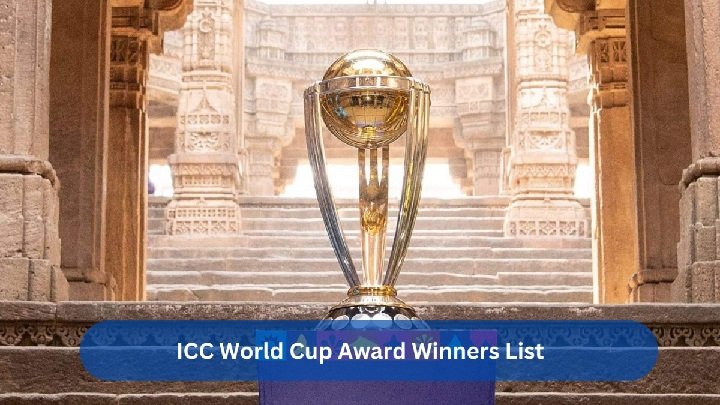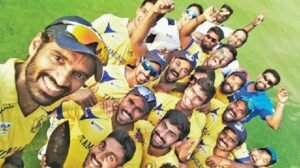
ICC Cricket World Cup Awards Winners
The ICC Cricket World Cup is one of the most celebrated events in the world of sports. Since its inception in 1975, the tournament has witnessed legendary performances, unforgettable matches, and iconic moments. Along with the excitement of the games, the ICC recognizes individual brilliance and team achievements with prestigious awards.
In this article, we will take a detailed look at the ICC Cricket World Cup awards winners across different categories. From the Player of the Tournament to the Emerging Player Award, this guide highlights the cricketing legends who have left an indelible mark on the World Cup stage.
Table of Contents
Toggle1. The Prestigious Awards of the ICC Cricket World Cup
The ICC honors players and teams for their outstanding contributions during the tournament with awards such as:
- Player of the Tournament
- Man of the Match (Final)
- Highest Run-Scorer (Golden Bat)
- Highest Wicket-Taker (Golden Ball)
- Best Emerging Player
- Spirit of Cricket Award
Let’s dive into the winners of these awards from each edition of the ICC Cricket World Cup.
2. Player of the Tournament Winners
The Player of the Tournament award recognizes the individual who has consistently delivered exceptional performances throughout the World Cup. Below is a complete list of winners:
| Year | Player | Country | Notable Performances |
|---|---|---|---|
| 1992 | Martin Crowe | New Zealand | 456 runs in 9 matches |
| 1996 | Sanath Jayasuriya | Sri Lanka | Game-changing batting and bowling |
| 1999 | Lance Klusener | South Africa | 281 runs, 12 wickets |
| 2003 | Sachin Tendulkar | India | 673 runs in 11 matches |
| 2007 | Glenn McGrath | Australia | 26 wickets in 11 matches |
| 2011 | Yuvraj Singh | India | 362 runs, 15 wickets, and 4 MoMs |
| 2015 | Mitchell Starc | Australia | 22 wickets at an economy of 3.50 |
| 2019 | Kane Williamson | New Zealand | 578 runs, brilliant captaincy |
| 2023 | TBA | – | Pending announcement |
3. Man of the Match Winners in World Cup Finals
The Man of the Match award for the final highlights the player who delivered a decisive performance in the most critical game of the tournament.
| Year | Player | Country | Contribution in Final |
|---|---|---|---|
| 1975 | Clive Lloyd | West Indies | 102 runs off 85 balls |
| 1979 | Viv Richards | West Indies | 138* runs, superb fielding |
| 1983 | Mohinder Amarnath | India | 3 wickets, vital 26 runs |
| 1987 | David Boon | Australia | 75 runs anchoring innings |
| 1992 | Wasim Akram | Pakistan | 3 key wickets in final |
| 1996 | Aravinda de Silva | Sri Lanka | 107* runs, 2 wickets |
| 1999 | Shane Warne | Australia | 4 wickets for 33 runs |
| 2003 | Ricky Ponting | Australia | 140* off 121 balls |
| 2007 | Adam Gilchrist | Australia | 149 off 104 balls |
| 2011 | MS Dhoni | India | 91* and winning six |
| 2015 | James Faulkner | Australia | 3/36 in 9 overs |
| 2019 | Ben Stokes | England | Match-saving 84*, super over brilliance |
4. Highest Run-Scorers (Golden Bat Winners)
The Golden Bat is awarded to the tournament’s leading run-scorer. Here’s a look at the stars who dominated with the bat:
| Year | Player | Country | Runs Scored |
|---|---|---|---|
| 1975 | Glenn Turner | New Zealand | 333 runs in 4 matches |
| 1979 | Gordon Greenidge | West Indies | 253 runs in 4 matches |
| 1983 | David Gower | England | 384 runs in 7 matches |
| 1987 | Graham Gooch | England | 471 runs in 8 matches |
| 1992 | Martin Crowe | New Zealand | 456 runs in 9 matches |
| 1996 | Sachin Tendulkar | India | 523 runs in 7 matches |
| 1999 | Rahul Dravid | India | 461 runs in 8 matches |
| 2003 | Sachin Tendulkar | India | 673 runs in 11 matches |
| 2007 | Matthew Hayden | Australia | 659 runs in 11 matches |
| 2011 | Tillakaratne Dilshan | Sri Lanka | 500 runs in 9 matches |
| 2015 | Martin Guptill | New Zealand | 547 runs in 9 matches |
| 2019 | Rohit Sharma | India | 648 runs in 9 matches |
5. Highest Wicket-Takers (Golden Ball Winners)
The Golden Ball honors the tournament’s highest wicket-taker, often a key figure in their team’s success.
| Year | Player | Country | Wickets Taken |
|---|---|---|---|
| 1975 | Gary Gilmour | Australia | 11 wickets in 2 matches |
| 1979 | Mike Hendrick | England | 10 wickets in 5 matches |
| 1983 | Roger Binny | India | 18 wickets in 8 matches |
| 1987 | Craig McDermott | Australia | 18 wickets in 8 matches |
| 1992 | Wasim Akram | Pakistan | 18 wickets in 10 matches |
| 1996 | Anil Kumble | India | 15 wickets in 7 matches |
| 1999 | Geoff Allott | New Zealand | 20 wickets in 9 matches |
| 2003 | Chaminda Vaas | Sri Lanka | 23 wickets in 10 matches |
| 2007 | Glenn McGrath | Australia | 26 wickets in 11 matches |
| 2011 | Shahid Afridi | Pakistan | 21 wickets in 8 matches |
| 2015 | Mitchell Starc | Australia | 22 wickets in 8 matches |
| 2019 | Mitchell Starc | Australia | 27 wickets in 10 matches |
6. Emerging Player and Spirit of Cricket Awards
The ICC also acknowledges the young talents and teams upholding the spirit of the game.
Emerging Player Award Winners
This award has spotlighted rising stars, many of whom became future cricket legends.
Spirit of Cricket Award Winners
The Spirit of Cricket is often awarded to teams that showcase fair play, camaraderie, and respect for opponents.
7. Conclusion
The ICC Cricket World Cup has been a stage for cricketing greatness, and its awards highlight the best performances in every edition. From memorable innings to extraordinary bowling spells, these winners have etched their names in the annals of cricket history.
Whether you are a seasoned cricket fan or new to the game, knowing about the ICC Cricket World Cup awards winners enriches your appreciation for the tournament and its storied legacy.
Additional Insights into ICC Cricket World Cup Awards
The ICC Cricket World Cup is not just about the thrill of matches; it’s also about celebrating individual brilliance and team achievements. Beyond the awards mentioned earlier, there are fascinating details and trends associated with these honors. Let’s dive deeper into more aspects of ICC Cricket World Cup awards.
1. Breaking Down Player of the Tournament Performances
The Player of the Tournament award often highlights all-round performances, showcasing a player’s contribution across batting, bowling, and fielding.
- Yuvraj Singh (2011): His performance remains iconic, as he battled cancer during the tournament. His all-round excellence, with 362 runs and 15 wickets, made him the backbone of India’s World Cup-winning campaign.
- Glenn McGrath (2007): The only pure bowler to win this award, McGrath dominated with his accuracy and consistency, taking 26 wickets to lead Australia to a historic third consecutive title.
Interesting Fact:
No wicketkeeper has won the Player of the Tournament award, though players like Adam Gilchrist (2007) and MS Dhoni (2011) played pivotal roles in their teams’ success.
2. Captains Who Stole the Show
Captains have often played a vital role in shaping their team’s success in World Cup history. Some of them have even won major awards:
- Clive Lloyd (1975): The West Indies captain delivered a scintillating century in the inaugural World Cup final, earning the Man of the Match title.
- Kane Williamson (2019): As Player of the Tournament, Williamson displayed tactical brilliance and consistency, scoring 578 runs and leading New Zealand to a thrilling final.
Fun Fact:
MS Dhoni remains the only captain to hit a six to seal a World Cup victory (2011).
3. Award Trends Across Eras
1975–1987:
In the early years, awards primarily celebrated standout individual performances in specific matches rather than tournament-wide dominance. Fielding and athleticism began to gain attention, but they were not formally awarded.
1992–2003:
The World Cup saw increased recognition of all-rounders, with players like Lance Klusener and Sachin Tendulkar dominating multiple facets of the game.
2007–2019:
This period brought in statistical excellence with awards like the Golden Bat and Golden Ball gaining prominence. Advanced technology also enhanced the judging process for awards, ensuring more accuracy in recognizing winners.
4. Memorable Performances in Losing Causes
While awards are usually associated with victorious teams, some remarkable performances came from players on losing sides:
- Graham Gooch (1987): Scored 471 runs in England’s campaign, including a fighting 115 in the final against Australia.
- Martin Guptill (2015): His unbeaten 237 against the West Indies remains the highest individual score in World Cup history, though New Zealand fell short in the final.
5. The Role of Emerging Players
While the official Emerging Player Award was introduced in later editions, several young players have left an indelible mark:
- Imran Khan (1975): At just 22, he showcased glimpses of his brilliance as an all-rounder in Pakistan’s early campaigns.
- Ricky Ponting (1996): Ponting’s consistent performances with the bat during this World Cup were a precursor to his legendary career.
Current Focus:
With more structured awards in recent editions, young players like Shaheen Afridi (2019) and Rachin Ravindra (2023) are gaining recognition early in their careers.
6. Women’s Cricket World Cup Awards
Though this article focuses on the men’s ICC Cricket World Cup, it is worth mentioning the similar recognition in the ICC Women’s Cricket World Cup:
- Ellyse Perry (2013): Known for her all-round brilliance, Perry’s performances stood out as she helped Australia clinch the title.
- Alyssa Healy (2022): With a record-breaking 509 runs, including a stunning 170 in the final, Healy was named Player of the Tournament.
Notable Difference:
Women’s World Cup editions have seen more dominance from all-rounders compared to the men’s tournaments.
7. Impact of Awards on Players’ Careers
Winning an ICC World Cup award often elevates a player’s reputation and cements their legacy:
- Lance Klusener (1999): Known as “Zulu,” his late-match heroics earned him a cult status despite South Africa’s heartbreak in the semifinals.
- Mitchell Starc (2015, 2019): Starc’s back-to-back Golden Ball wins established him as one of the greatest fast bowlers in World Cup history.
8. Innovations in Award Judging
The ICC continues to refine how winners are chosen for various awards:
- Data-Driven Insights: Metrics like batting strike rates, bowling economy, and pressure-handling are increasingly considered.
- Fan Involvement: In recent tournaments, fans have played a role in voting for some awards, ensuring greater engagement.
9. Lesser-Known Facts About ICC World Cup Awards
- First Award Presentation: Awards were first formally introduced in the 1983 edition, but recognition for standout players existed in earlier tournaments.
- Shared Awards: In 2011, the Golden Ball was shared between Shahid Afridi (Pakistan) and Zaheer Khan (India), both with 21 wickets.
- Oldest Winner: Glenn McGrath, at 37, became the oldest Player of the Tournament in 2007.
10. Future of ICC Awards
With the rise of new talents and formats, ICC may introduce additional awards in future World Cups, such as:
- Best Fielder: To honor spectacular catches and run-outs.
- Impact Player: Recognizing players who make game-changing contributions.
The evolution of awards ensures that the game continues to celebrate all facets of cricket, keeping fans engaged and players motivated.
Conclusion
The ICC Cricket World Cup awards not only honor exceptional performances but also narrate the stories of players and teams that shaped cricketing history. From batting marvels to bowling dominance, these awards encapsulate the essence of the game’s finest moments.
Whether it’s the glory of lifting the Golden Bat or the thrill of being named Player of the Tournament, these accolades inspire players to achieve greatness and provide fans with memories to cherish forever.
Read More: Cricket Ranji: The Complete Guide to India’s Prestigious Domestic Tournament





